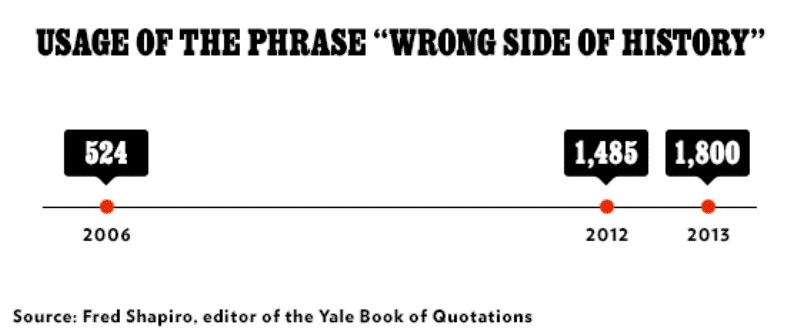
16 Mar What’s wrong with being right? (blog by Jessica Roitman)
Historians such as myself have cause to rejoice, if recent American political rhetoric is anything to go by. History, that heretofore scantily-funded discipline of the humanities known (along with English and Anthropology) as the repository for directionless college students destined for stimulating careers in retail and food service, seems to have become the standard by which any question must now be judged. “Being on the right [or wrong] side of history” are phrases being bandied about more frequently in the American media than “liminality” and “Orientalism” at a get-together of post-modernists. Surely we chronically curmudgeonly historians should be jumping up and down, right? Well . . . no . . . actually not.
After all, everyone from President Obama to Christian Right leaders such as Billy Graham deem themselves competent to judge what constitutes this right and wrong side of history. And nary a history degree among them. Apparently, any and everyone knows enough about history to make such calls about what side whatever controversial topic will fall on. This doesn’t bode well for we hordes of un and underemployed historians. So no jobs then. But, more importantly – well, I guess that depends how desperate the historian is, but you get my point here – is that the phrase is nonsense and should be scrapped from the vocabulary of all these political Nostradamus wannabes – and the rest of us, as well.
Let’s use some examples from my own particular corner of historical studies – the Caribbean, that oft-forgotten weedy corner of America’s “backyard,” to show the absurdity of trying to ascertain the “right” and “wrong” sides of history. In 1953, Fidel Castro claimed that “History will absolve me” in his famous speech justifying his rebellion against Fulgencio Batista. In that moment in the early 1950s, Castro looked to be on the right side of history. He was striving valiantly against an American-backed dictatorship, and was soon to gain the help of other young idealists such as Che Guevara, he who is lately enjoying a resurgence of popularity on made-in-China tee-shirts sported by 20-somethings with only the sketchiest of ideas of whose visage is gracing their bosoms. This triumph of global capitalism doubtless has the poor Argentine turning over in his re-interred grave in Cuba. But back to Fidel’s side of history. Because it wouldn’t just be rabid Cuban exiles and their progeny in Miami who would view Castro, himself, as a dictator — a decrepit old dictator whose police-state has oppressed the very people he claimed to be freeing decades ago. But history absolves him. Right?
And what are we liberal intellectuals who so want to be on history’s right side to do with the current situation on the Dutch Caribbean islands of Bonaire, St. Eustatius, and Saba? These islands were made “special municipalities” of the Netherlands in late 2010. That has meant all sorts of changes for these small places, including the demand to immediately institute The Netherlands’ liberal social policies in these traditionally conservative societies. And who could object? Supporting abortion, same sex marriage, and euthanasia means being on the right side of history, at least according to both the prevailing political rhetoric in America and the majority of Dutch people. Yet what about self-determination? Respect for local cultures, norms, and beliefs? The rights of the formerly colonized over and against the former colonizer? All of which are, of course, values and ideals cherished by liberal intellectuals and support for which would seem to put us . . . on the right side of history . . .
You see the point. I’m not saying “Down with Castro!” or “No abortion in Bonaire! I’m saying that talking about the “right” and “wrong” sides of history is the secular equivalent of claiming that “God is on our side.” And using that phrase would put most of us on the wrong side of history these days. Philosophically, my issue is that claiming that history has a side makes certain kinds of progress seem inevitable, while ignoring the fact that “progress” is always uncertain and can be (and often is) undone – witness Castro’s Cuban Revolution. Rhetorically, I have issues with the fact that the “right [or wrong] side of history” is a claim deployed in political debate to delegitimate one’s opponents. And practically, as my examples from the small Dutch islands of St. Eustatius, Saba, and Bonaire illustrate, real life problems and their potential solutions are rarely so clear-cut as history’s supposed arbiters would have it.
Thankfully . . . there’s still plenty of work for historians, then. Who’s hiring?




No Comments